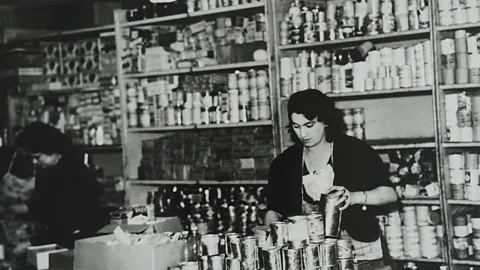As the need for these subsistence methods dissipated, French cuisine underwent another period of change. In 1963, the country welcomed its first Carrefour hypermarket, and large-scale supermarkets soon supplanted small shops. According to Grenard, this was partly due to “suspicion” following corruption during the German occupation, when some grocers inflated prices far past the norm, just because they could . “At the end of the war, consumers held real rancour against small shopkeepers,” said Grenard. “In a supermarket, the prices are fixed.”
Fast-forward eight decades, and some locals, now motivated by climate change are turning back to small, local grocers, such as the locavore Terroir d’Avenir shops dotting Paris. Others are reaching into the nation’s past to resuscitate techniques like canning, preserving and foraging that saved many French residents during the war, according to Grenard. “The people that got by the best were the ones who had reserves.”
 Alamy
AlamyToday, filling the larder with foraged food has become popular once again. In Kaysersberg, Alsace, chef Jérôme Jaegle of Alchémille puts this ancestral knowledge centre-stage by offering wild harvesting workshops culminating in a multi-course meal. And in Milly-la-Forêt, just outside Paris, François Thévenon highlights the foraging techniques he learned from his grandmother with classes teaching others how to seek out these edible plants themselves.
“After the war”, he explained, “people wanted to reassure themselves that they wouldn’t lack anything anymore.” They turned, he said, to overconsumption, specifically of meat, which even his foraging grandmother ate every day, at every meal.
“You often hear when you ask older folk why they no longer eat wild plants, that it’s because they don’t have to,” Thévenon said, who forages for wild plants because he believes it’s good for his health and that of the planet.
According to Apollonia, the war didn’t only change how France eats. “It probably changed the way the world eats,” she asserted. Today, the techniques and philosophies that helped the French survive are slowly coming back to life.